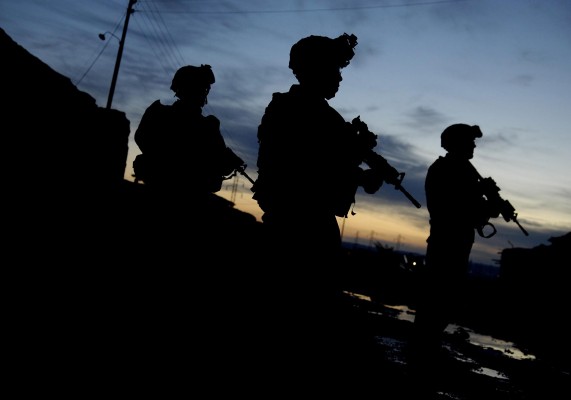Point: The Answer in Iraq Is Not Military Action
August 28, 2014

“Iraq’s future will be in the hands of its people. America’s war in Iraq will be over,” President Obama announced to troops at the Fort Bragg military base in North Carolina on Dec. 14, 2011, one day before the official end to the eight-year-long Operation Iraqi Freedom. I wish those words still held true. But, not even three years later, on Aug. 7, 2014, President Obama became the fourth consecutive president to authorize military action in Iraq by ordering precision airstrikes on the Islamic State (also known as ISIS or ISIL).
The United States justifies its military action as “humanitarian intervention,” and the mainstream media sells it as such. But bombing for “humanitarian” ends never actually helps anyone or defeats an enemy; we can’t bomb our way to peace. Terrorist organizations use bombing to recruit more terrorists. If “moderate” Muslims (by “moderate,” I mean not jihadist) see U.S. bombs killing innocent civilians and destroying towns, I’m not surprised that they develop a severe anti-American sentiment. When we order drone strikes on wedding ceremonies in Yemen to “kill terrorists” (Dec. 12, 2013), when we detain Muslims at Guantanamo Bay without charging them with a crime (600 of the 779 were released without charges, many after being held for years according to Human Rights Watch), when we kill U.S. citizens without charging them with a crime (see Anwar al-Awlaki, New Mexican born imam killed by a drone strike in Yemen in Sept. 2011), we’re actually creating more terrorists – the principle of blowback. Terrorists become terrorists because we are terrorists first.
Also, has no one considered that maybe we don’t actually care about solving “humanitarian” crises in the Middle East, considering that the U.S. government doesn’t oppose the violent subjugation of populations there? Example A: Israel. One thing that every elected politician publicly agrees on is continued support for the apartheid state of Israel and its war crimes. Example B: Egypt. Not only did Hillary Clinton say, “I really consider President and Mrs. Mubarak to be friends of my family,” but also the United States has continued to militarily and economically support the dictators of Egypt since Mubarak’s ouster. Example C: Saudi Arabia. According to a secret National Security Agency (NSA) memo published by Glenn Greenwald of The Intercept, the United States “has an interest in regime continuity” in the brutally repressive government of Saudi Arabia. With our history of supporting tyranny and oppression, why would anyone believe the propaganda about “humanitarian” goals in the region?
Let’s remember another fact: ISIS exists because of us. When Brett McGurk, a top State Department official, said to House and Senate lawmakers in July that ISIS is “worse than al-Qaeda,” did he consider why? It’s because of the nearly nine-year U.S. occupation of Iraq and, more largely, the global war on terrorism. At the time of 9/11, terrorist organizations (including al-Qaeda) were small and unorganized. Today, they are powerful. During the occupation of Iraq, we destroyed its infrastructure, government and military. Newly unemployed, these Saddam-era soldiers joined insurgent militias – eventually forming a coalition that has become ISIS. The United States also supported and installed Nouri al-Maliki as prime minister in 2006, who ruled along strict Shia sectarian lines, squashed dissent, and thus convinced many Sunnis that their only hope was in the form of a military: ISIS. Moreover, when ISIS members were fighting against Syrian President Bashar al-Assad, the United States provided them with weapons.
There is a serious crisis in Iraq – no one doubts that. The desire to help is understandable. So what can we do? A lot, actually, according to Phyllis Bennis, fellow at the Institute for Policy Studies. Call on our regional allies to impose an arms embargo. Work with Iran to pressure the Iraqi government to end sectarianism and human rights violations. Engage with the citizens of Iraq and the international community to help bring about a political solution. Lastly, of course, provide non-lethal humanitarian aid to refugees across the region.
The end goal is to stop all wars – not create more of them. The only way to do that is to take all military action off the table. President Obama did indeed speak truth in that same speech at Fort Bragg when he said, “It’s harder to end a war than to begin one.”
COUNTERPOINT: Kurdistan Has a Future, Not a United Iraq








